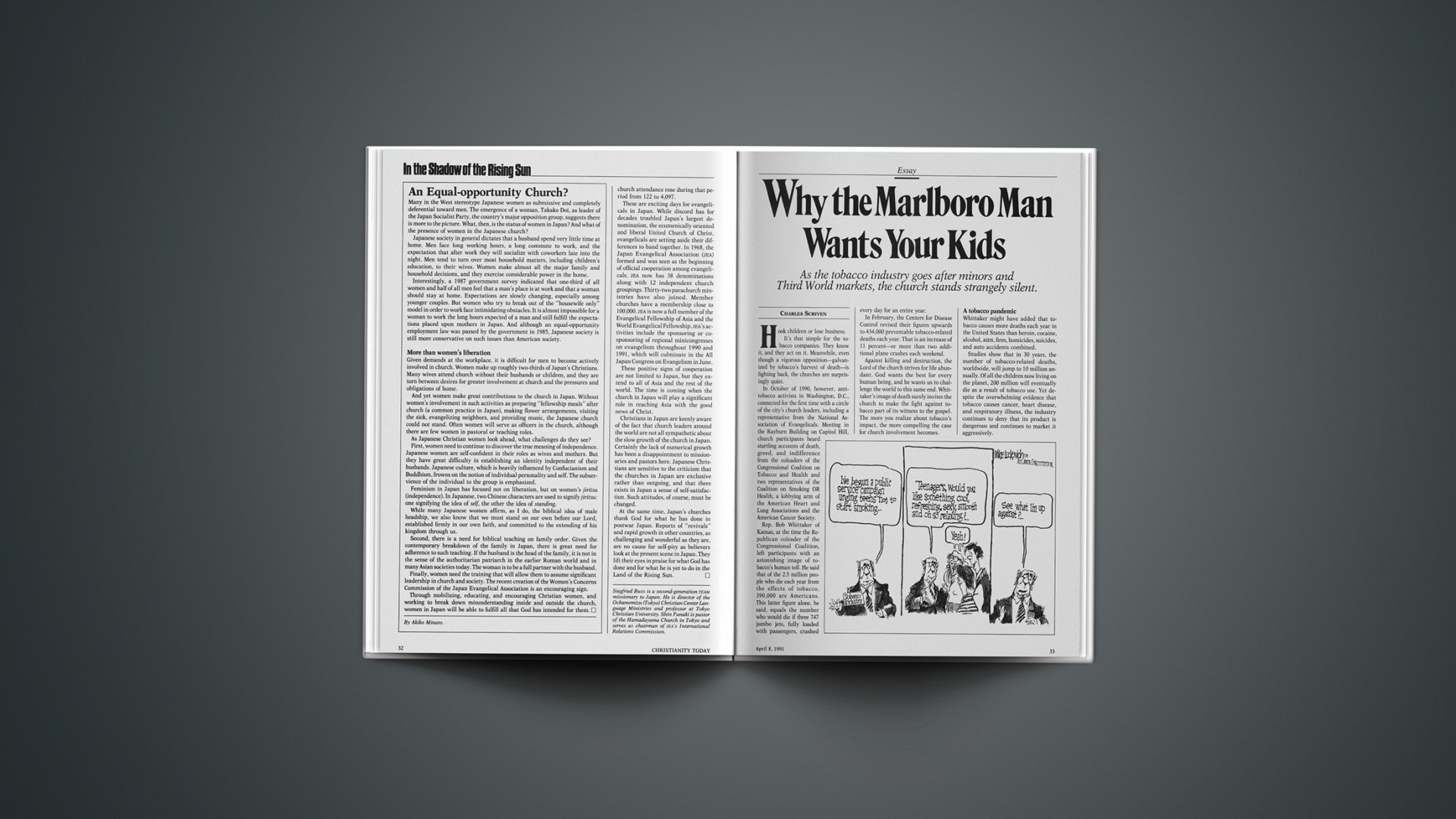Many in the West stereotype Japanese women as submissive and completely deferential toward men. The emergence of a woman, Takako Doi, as leader of the Japan Socialist Party, the country’s major opposition group, suggests there is more to the picture. What, then, is the status of women in Japan? And what of the presence of women in the Japanese church?
Japanese society in general dictates that a husband spend very little time at home. Men face long working hours, a long commute to work, and the expectation that after work they will socialize with coworkers late into the night. Men tend to turn over most household matters, including children’s education, to their wives. Women make almost all the major family and household decisions, and they exercise considerable power in the home.
Interestingly, a 1987 government survey indicated that one-third of all women and half of all men feel that a man’s place is at work and that a woman should stay at home. Expectations are slowly changing, especially among younger couples. But women who try to break out of the “housewife only” model in order to work face intimidating obstacles. It is almost impossible for a woman to work the long hours expected of a man and still fulfill the expectations placed upon mothers in Japan. And although an equal-opportunity employment law was passed by the government in 1985, Japanese society is still more conservative on such issues than American society.
More Than Women’s Liberation
Given demands at the workplace, it is difficult for men to become actively involved in church. Women make up roughly two-thirds of Japan’s Christians. Many wives attend church without their husbands or children, and they are torn between desires for greater involvement at church and the pressures and obligations of home.
And yet women make great contributions to the church in Japan. Without women’s involvement in such activities as preparing “fellowship meals” after church (a common practice in Japan), making flower arrangements, visiting the sick, evangelizing neighbors, and providing music, the Japanese church could not stand. Often women will serve as officers in the church, although there are few women in pastoral or teaching roles.
As Japanese Christian women look ahead, what challenges do they see?
First, women need to continue to discover the true meaning of independence. Japanese women are self-confident in their roles as wives and mothers. But they have great difficulty in establishing an identity independent of their husbands. Japanese culture, which is heavily influenced by Confucianism and Buddhism, frowns on the notion of individual personality and self. The subservience of the individual to the group is emphasized.
Feminism in Japan has focused not on liberation, but on women’s jiritsu (independence). In Japanese, two Chinese characters are used to signify jiritsu: one signifying the idea of self, the other the idea of standing.
While many Japanese women affirm, as I do, the biblical idea of male headship, we also know that we must stand on our own before our Lord, established firmly in our own faith, and committed to the extending of his kingdom through us.
Second, there is a need for biblical teaching on family order. Given the contemporary breakdown of the family in Japan, there is great need for adherence to such teaching. If the husband is the head of the family, it is not in the sense of the authoritarian patriarch in the earlier Roman world and in many Asian societies today. The woman is to be a full partner with the husband.
Finally, women need the training that will allow them to assume significant leadership in church and society. The recent creation of the Women’s Concerns Commission of the Japan Evangelical Association is an encouraging sign.
Through mobilizing, educating, and encouraging Christian women, and working to break down misunderstanding inside and outside the church, women in Japan will be able to fulfill all that God has intended for them.










